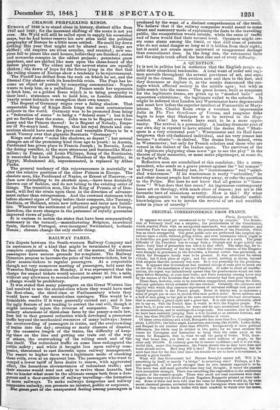RAILWAY FARES.
THE dispute between the South-western Railway Company and its customers is of a kind that might be terminated by a more complete explanation. On the face of the matter, the habitual passengers have serious grounds for complaint. The Railway Directors propose to increase the price of the return-tickets, but to allow season-tickets to regular passengers. At a respectable though not very numerous meeting of passengers, held near the Waterloo Bridge station on Monday, it was represented that the charge for annual tickets would amount to about 2/. 10s. a mile, without any allowance to second-class passengers ; and that such a charge would be prohibitory.
It was stated that many passengers on the Great Western line had resolved to use the second-class where they would have used the first-class, the third-class or Parliamentary where they would have used the second-class carriages. This would be a formidable resolve if it were generally carried out ; and it has the ugly feature of not tending to correct the real evil, though it might seriously injure the revenue of companies. The com- pulsory abatement of third-class fares by the penny-a-mile law, first led to that general reduction which developed a premature traffic beyond the mechanical resources of many railways : hence the overcrowding of passengers in trains, and the overcrowding of trains into the day; creating so many chances of disaster, by the excessive length of the trains, the difficulty of keep- mg time on the line and getting one train out of the way of others, the overworking of the rolling stock and of the line itself. The redundant traffic on some lines endangered the public safety ; and while it brought loss upon railway com- panies, threatened to cast discredit upon railway management. The resort to higher fares was a legitimate mode of checking these evils, even at an apparent loss. The passengers who want to Compel a lower tariff of fares desire to renew, with aggravated effect, the hazardous circumstances of redundant traffic; and their success would tend not only to revive those hazards, but also to hinder what must be the ultimate escape both from a dan- gerous and a dear condition of railway travelling—the formation of more railways. To make railways dangerous and railway comPanies unlucky, can promote no interest, public or corporate. But great part of the exasperated feeling among passengers is produced by the want of a distinct comprehension of the truth. We believe that if the railway companies would resort to some direct and summary mode of explaining the facts to the travelling public, the exasperation would subside, while the rates of traffic and of fares would find their natural level. Openness might cre- ate some alarm among the timid, or that dull class of persons who do not mind danger so long as it is hidden from their sight ; but it could not create more untoward or exaggerated feelings than concealment does. In the long run, the substantial facts and the simple truth afford the best clue out of every difficulty.


























 Previous page
Previous page